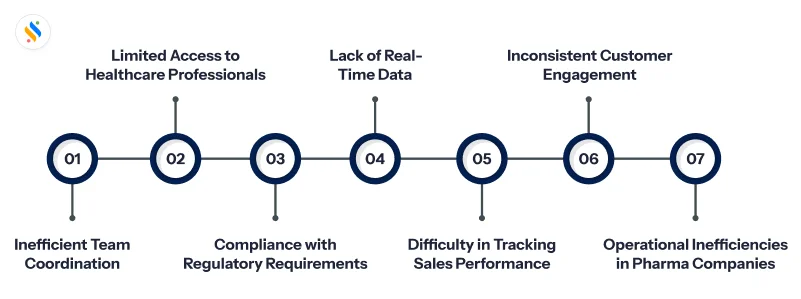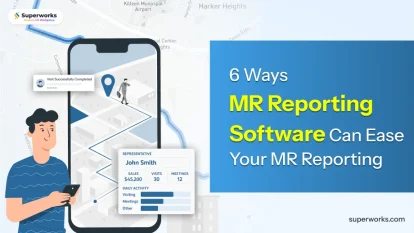
The Indian pharmaceutical industry faces increased competition over the same therapeutic spaces due to scientific advancements. From following strict regulatory compliance to serving the pharmaceutical supply chain management complexities, sales teams in the pharma sector work in one of the most challenging environments. On top of that, growing competition, evolving decision-making processes, and the adoption of new technology further add to these pharma industry challenges. Thus to help you emerge and carry out your core operations smoothly, we are here. Today, we will discuss the pharma industry key challenges faced by the field sales team. Besides that, we will also take a look at how emerging software like using field force management software, optimizing field operations, and managing pharma industry challenges using technology can help simplify these processes.
Whether it’s about improving customer engagement, reducing direct costs, or overcoming supply and value chain disruptions, by understanding these pharmaceutical industry problems you can make your move toward achieving success in this highly competitive industry.
Pharma Industry Challenges You Can’t Skip

1. Inefficient Team Coordination
Managing a large pharmaceutical sales team scattered at different locations is really a tough job which becomes one of the foremost pharma industry challenges. The team often has to travel to extensive locations which might or might not have proper connectivity. In such scenarios scheduling and coordination becomes next to impossible.
As a result, the team might face overlapping client visits or missed appointments, which can waste time and resources. The major drawback here is the unavailability of a centralized platform. It increases the load on the management side and it becomes difficult for managers to track daily field operations which results in gaps in accountability and often oversight.
Apart from this issue, poor communication worsens the situation as there is no way that managers and members can communicate. Without knowing the real-time details of an employee, managers struggle to help with on-ground pharma industry challenges or adjust strategies as per the need. For sales reps, the lack of guidance causes duplicacy, disorganized interactions, and missed opportunities. As a result, customer satisfaction gets affected and the customer gets pissed which has a negative impact on the business.
Moreover, as the team members operate independently there’s no way to share insights or work together on effective sales strategies. This additionally affects the team’s ability to adapt to dynamic market demands or handle critical situations. For an industry like pharmaceuticals, such inefficiencies can be one of the pharma challenges being a reason for significant losses in market share and growth potential. Digital transformation can help serve the pharma industry challenges, enhance efficiencies and respond to market changes faster.
2. Limited Access to Healthcare Professionals
Connecting to healthcare professionals for healthcare services is a major issue for pharmaceutical sales teams. Physicians and healthcare have busy schedules, balancing patient care, administrative tasks, and ongoing education. Thus they don’t get enough time to interact with sales representatives. Various institutional policies and industry regulations also restrict rep visits, reducing face-to-face opportunities to connect.
The shift towards virtual consultations and telehealth has further complicated traditional sales approaches. Many healthcare professionals now prefer digital or asynchronous communication, leaving reps to adapt to these changing preferences without much preparation or resources. Consequently, building meaningful relationships and gaining trust has become significantly more difficult.
Moreover, competition among pharmaceutical companies for the attention of the same stakeholders adds another layer of complexity. Sales teams often find themselves competing for limited time slots, with little room to differentiate their products or services. Without access to decision-makers, they struggle to demonstrate the value of their offerings, answer questions effectively, or address specific concerns.
This lack of interaction not only impacts sales figures but also affects the company’s ability to educate stakeholders about the unique benefits of its products. In an industry where trust and personal relationships are critical, limited access poses a serious threat to success. It stands as the second most position in pharma industry challenges.
3. Compliance with Regulatory Requirements
The regulatory guidelines of the pharmaceutical industry are very strict and sales activities are no exception. There are rules for promotional practices, healthcare interactions, and product claims, that are both extensive and intricate. For sales representatives, working under these regulations while maintaining productivity is a very big challenge. A single mistake can result in imposing great fines, legal repercussions, and long-term damage to the company’s reputation.
To make sure compliance reps must stay updated on changing guidelines, that can vary by region, product category, or even the target audience. Traditional methods of tracking these requirements often lead to errors, that create potential risks for the organization. Moreover, a lack of proper oversight or documentation can make it hard to prove compliance during audits or investigations.
For managers, keeping track of the field service team’s adherence to regulations is necessary. But without the right tools, it becomes impossible to make sure that every rep follows the specified protocols. This pharma industry challenges even becomes bigger with the need to train new team members quickly and efficiently, especially in a high-turnover industry like pharmaceuticals. Compliance is not just a legal need; it is also a competitive benefit, and failing to do so can have serious consequences.
Struggling to make your pharmaceutical field operations quick?
Learn how field force management software can improve your team's coordination, track performance, & simplify compliance.
4. Lack of Real-Time Data
As per the market today, not having real-time data is a major obstacle for pharmaceutical field sales teams. Reps often work without having access to up-to-date customer information, sales history, or market trends, which makes it difficult for them to tailor their pitches effectively. This lack of recent data can result in common, less impactful interactions with stakeholders.
For example, a rep might miss highlighting a product feature that specifically focuses on a customer’s current needs. Same way, without real-time data, managers cannot keep track of ongoing sales activities or change them to meet changing market demands. This lack of communication between the field team and management creates inefficiencies and makes decision-making processes endless.
Real-time analytics play a great role in tracking team performance. Without them, determining areas of improvement or recognizing top-performing reps becomes very difficult. This delay in accessing actionable insights can result in missed opportunities, lower productivity, and eventually, decreased revenue. As the pharmaceutical industry focuses on data-driven results, this pharma industry challenges becomes a bigger concern.
5. Difficulty in Tracking Sales Performance
To maintain a competitive edge, you must make sure how effective your field sales team is. However, it becomes challenging with traditional or outdated systems. Managers often find it difficult to keep track of metrics like visit frequency, conversion rates, and territory coverage, which leads to incomplete or inaccurate assessments.
Without clear data, it becomes problematic to find top performers or pain points where further training is required. Failing to do proper performance tracking makes it an issue for companies to address gaps in their sales funnel or optimize their strategies for better results. For example, if data is improper managers may not be able to find the reason whether the issue is with the sales approach, market conditions, or customer preferences.
Apart from that, when the sales rep doesn’t get constructive feedback or credit for their accomplishments, they might get demotivated and sad which can result in decreased morale and productivity. As the pharmaceutical industry has tight margins and high stakes, this lack of tracking can cause major consequences.
6. Inconsistent Customer Engagement
To be successful in the pharmaceutical industry, forming a bond of trust is a must. However, keeping a customer engaged and satisfied are common pharma industry challenges for field teams. Without having proper tools to log interactions, reps may forget follow-ups, fail to address customer concerns or overlook opportunities to deliver value-added services.
This scenario is due to the toggle and back-and-forth faced by the sales team to communicate with the team members. Imagine if you receive inconsistent information from two sales reps of the same company. Such situations can affect the company’s credibility and hamper trust with time.
Moreover, as the pharmaceutical market becomes more complex, personalized and targeted engagement strategies become the need of the hour. Generic pitches can no longer align with stakeholders who look for tailored solutions to meet their unique needs. Without the ability to track and analyze customer choices, reps fail to deliver the customized experiences that drive loyalty and long-term success.
7. Operational Inefficiencies in Pharma Companies
Pharma teams consistently juggle multiple administrative tasks that include tracking inventory, distributing samples, and submitting expense reports. As these processes traditionally rely on manual methods, it become time-consuming, error-prone, and frustrating. Such issues divert attention from the major sales responsibilities and result in reduced productivity which becomes one of the core challenges in pharma industry.
For example, delays in presenting reports or managing inventory can affect the entire drug manufacturers development and sales cycle, which can result in missed opportunities and dissatisfied customers. These pharma industry challenges also lead to increased operational costs, as additional resources might be required to address errors or delays.
Managers also struggle with different difficulties when overseeing these tasks. Observing team activities, taking care of compliance, and maintaining quality control are challenging without a streamlined system. As time is money, operational inefficiencies can affect the overall performance which makes it crucial to address this challenge head-on. One solution to this is conducting field audit at different intervals.
Final Thoughts on Pharma Challenges
That’s all for this blog! Here we learned about the common pharma industry challenges faced by pharma teams. It covers communication issues in teams, limited access to healthcare professionals, compliance limitations, and the lack of real-time data. These significant challenges not only influence the overall productivity but also impact the overall growth and competitiveness of pharmaceutical companies.
By using field force management software, you can simplify operations, improve customer engagement, and provide compliance. Additionally, including tools like HRMS & payroll software can further ease team management, while field audit and field service solutions improve efficiency in field operations. Learning from similar challenges in construction industry, using innovative solutions becomes vital for success in the pharmaceutical sector.









